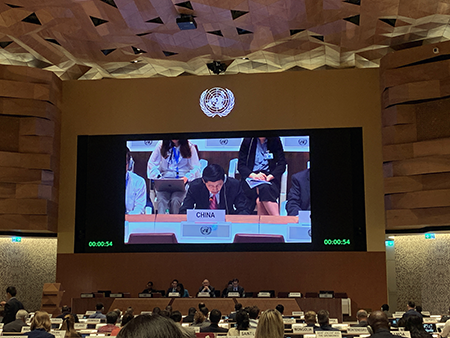"In my home there are few publications that we actually get hard copies of, but [Arms Control Today] is one and it's the only one my husband and I fight over who gets to read it first."
Meeting Works to Keep NPT Goals Alive
September 2024
By Shizuka Kuramitsu
With the future of nuclear nonproliferation and disarmament in the balance, states-parties to the nuclear Nonproliferation Treaty (NPT) are persisting in efforts to manage divisions and preserve the regime.

At the second meeting to prepare for the 2026 NPT Review Conference, the 118 states-parties showed that although chronic tensions over core nuclear weapons issues continue and deepen, there is still serious interest in salvaging the NPT regime.
The preparatory committee meeting was held July 22-Aug. 2 in Geneva to review implementation of the landmark 1968 treaty and develop a plan for making progress on its key components of nonproliferation, disarmament, and peaceful uses of nuclear energy. These preparatory committee meetings are intended to lay the groundwork for the NPT review conferences, which usually are scheduled every five years.
“The impact of the current contentious geopolitical environment has put the NPT under enormous strain. But lapsing into cynicism and inaction cannot be permitted; the stakes are too high,” said Izumi Nakamitsu, UN undersecretary-general and high representative for disarmament affairs, at the opening session.
Amid growing nuclear risks and geopolitical confrontations, delegates diverged on many issues such as the implementation of key treaty obligations and Iran’s nonproliferation commitments.
One particularly contentious topic was nuclear sharing arrangements, including the recent deployment of Russian nuclear weapons to Belarus. (See ACT, May 2024.) In a joint statement, Belarus and Russia said that the current international strategic environment is not favorable for disarmament and they justified the deployment by arguing that “such arrangements have been practiced by NATO members.”
Responding to international criticism, the Russian delegation said that the deployment “does not change the strategic situation at all because [the weapons] cannot reach the United States.”
Differences over the Russian deployment and NATO’s nuclear weapons policy led to the intense exchange of views among Belarus, Russia, Iran, the United States, and other NATO members. Italy, for example, echoed other allies in arguing that NATO nuclear sharing arrangements are legally compatible with the NPT and “have prevented proliferation…. No one objected to these arrangements for decades” until Russia’s “illegal annexation of Crimea,” an Italian delegate said.
Many states, including within the Non-Aligned Movement and New Agenda Coalition, voiced concerns regarding nuclear weapons sharing arrangements and extended deterrence more generally because they rest on threats of nuclear weapons use. These states-parties urged all countries to reduce the role of nuclear weapons in national security strategies.
The NPT process has long considered the ideal outcome of preparatory committee meetings to be a formal consensus agreement on the draft rules of procedure and provisional agenda, along with a formal summary by the meeting chair and recommendations for the review conference.
But because of intense divisions, no meeting since 2002 has adopted a chair’s factual summary by consensus. Instead, meeting chairs normally issue their factual summary as a working paper on their own authority. This is meant to put on record what states discussed during the meeting and serve as a blueprint for further discussion.
At last year’s first preparatory committee meeting, Iran, backed by Russia and Syria, challenged this practice and refused to list the chair’s summary even as a working paper, claiming that the summary favored Western states. Due to the objection, that meeting concluded unprecedently without a chair’s summary. (See ACT, September 2023.)
By contrast, the latest preparatory committee meeting listed the chair’s summary as a working paper in the meeting’s report, but with another unprecedented ending. On the last day, Russia asked the chair to insert a footnote to the summary to clarify that the document “represents solely the views of the chairman” and to add that “it is not agreed upon by the delegations and it does not fully reflect the positions of the delegations. This document shall not be considered as a basis for future work within the NPT review process.”
Austria, Germany, Mexico, and the Netherlands questioned this suggestion, but the meeting accepted Russia’s footnote and succeeded in leaving a chair’s summary in the record.
As the session concluded, the chair, Akan Rakhmetullin, Kazakhstan’s deputy foreign minister, admitted that, “undeniably, this meeting took place in extremely difficult challenging circumstances.” But he insisted that he “witnessed rich and active exchanges of positions which demonstrated the persistent interest of states-parties and the unquestionable relevance of this treaty.”
The third preparatory committee meeting is set for April 9-May 9, 2025, in New York and will be chaired by Harold Agyeman, Ghana’s UN ambassador.
